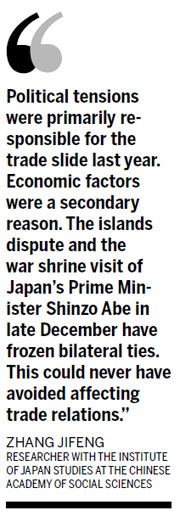|
 Visitors watch a promo of Japan's tourism programs at a China-Japan trade exhibition held in Dalian, Liaoning province, Oct 19, 2013. Trade between China and Japan is expected to continue its lackluster trend in 2014 owing to prolonged political tensions and structural change in East Asia. [Photo by Liu Debin / Asianewsphoto] |
Trade between China and Japan is expected to continue its lackluster trend in 2014 owing to prolonged political tensions and structural change in East Asia, experts said.
Last year, trade between the world's second-and third- largest economies declined despite the depreciation of the Japanese yen and China's achievement of becoming the world's largest goods trader.
"Political tensions were primarily responsible for the trade slide last year. Economic factors were a secondary reason. The islands dispute and the war shrine visit of Japan's Prime Minister Shinzo Abe in late December have frozen bilateral ties. This could never have avoided affecting trade relations," said Zhang Jifeng, a researcher from the Institute of Japan Studies at the Chinese Academy of Social Sciences, a top government think tank.
He added that trade prospects were improving before the end of last year with shipments increasing between the two economies after declines in the past two years. The China-Japan trade slide in 2013 was "not normal" in that the economies of the two countries registered satisfactory growth, and both countries' trade growth accelerated from the previous year amid a world economic recovery.
"I was optimistic had it not been for Abe's shrine visit. But now it's very hard to predict the bilateral trade prospects. I'm really not confident this year. There is a high possibility of another slowdown because no signs suggest improving ties between the two countries," Zhang said.
Li Jian, a researcher from the Chinese Academy of International Trade and Economic Cooperation, a think tank under the Ministry of Commerce, said China-Japan trade is likely to remain sluggish in 2014 and the improvement, "if there is one, will be very small compared with China's trade growth with other partners".
In 2013, Japan was China's fifth-largest trade partner. Bilateral trade declined 5.1 percent year-on-year to $312.55 billion, accounting for 7.5 percent of China's total trade value, according to the General Administration of Customs. China's exports to Japan went down 0.9 percent to $150.28 billion while Japan's exports to China declined 8.7 percent to $162.27 billion, leaving China with a trade deficit of $11.99 billion.
Bilateral trade in 2012 decreased 3.9 percent year-on-year to $329.45 billion, about 8.5 percent of China's total, according to China's Administration of Customs.
"As for the bilateral trade slowdown in 2013, the reason is sophisticated. Part of the reason is known to everyone and needs no explanation. But I still hope for a steady development of bilateral trade in 2014," Zheng Yuesheng, spokesman of the customs administration, told a news briefing on Jan 10.
"On the economic front, the change in trade structure in East Asia and the weakening of Japan's export competitiveness also accounted for its trade slide with China in 2013," Li said. "Japan's technological advantage is narrowing compared with South Korea and Southeast Asian economies. Chinese buyers are shifting their orders for mechanical equipment and key components from Japan to other economies in the region."
A survey before Abe's shrine visit, jointly conducted by the Nikkei in Japan, the Maeil Business Newspaper in South Korea and China's Global Times newspaper with hundreds of companies across the three nations, showed that up to 60 percent of China's corporate leaders were unwilling to do business with Japanese firms while 60 percent of corporate leaders in South Korea also voiced concern at conducting business with Japanese firms.
China and South Korea are the leading trade partners of Japan while China is heading to become the world's largest goods trader.
However, two-thirds of Japanese executives named Southeast Asia as their most promising market, suggesting an anticipated shift toward the region despite local tensions continuing.
Zhang, from the Chinese Academy of Social Sciences, said slowing Japanese investment in China also reduced purchases from Japan.
Japan's non-financial investment in China reached $6.76 billion, up 2.29 percent from a year earlier in the January-November period.
